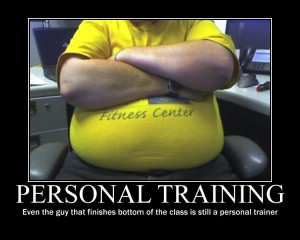Is personal training dead?
I was in the gym the other day, and there was a trainer putting these two women through a workout. These women were definitely wanting to lose some weight, and certainly hired this trainer with some body fat reduction goals.
But a few things led me to thinking that, it might not happen for these women. Is personal training dead? I wouldn’t go that far yet, but major changes need to happen in this industry to keep things moving forward and thriving.
Here’s why I think personal training needs to at minimum, undergo a revolution, if not, it may go away due to a poor ROI:
1. The trainer was putting these women through a complicated routine- using medicine balls, Bosu trainers, and stability balls. I’m sure these exercises were all good and well, but is this really what these women need if their goal is to say, lose 50 pounds? As Wes & I have said many times on the HMFB podcast, losing weight comes down to nutrition, first and foremost. Exercise is all good, but I would say about 90% of weight loss comes down to nutrition (after of course you have the right mindset!).
2. I overheard a conversation one of the women was having with the trainer. She said she drank a lot over the weekend and was now “working it off”. The trainer laughed and said well, it’s good that you’re here. Hmmmm….this led me to believe that there probably hasn’t been any talk of nutrition, or maybe it was the classic USRDA food pyramid nonsense. Drinking a lot of alcohol on the weekend and then going to the gym to “work it off” is not a recipe for success, and, it’s a waste of money to pay a trainer if you want to lose significant weight.

3. At one point, while the trainer was having the women go through an exercise with medicine balls (that honestly looked pretty tough!), her phone rang and…she answered it! So she’s chatting away on the phone while her clients are busting their butts. Is this motivating?
Sadly, I don’t think the above scenario is too far from typical scenarios at gyms everywhere. When I was doing personal training, I was certified through the American Council on Exercise (ACE), and National Acamdemy of Sports Medicine (NASM). ACE is still teaching the low fat/high carb food pyramid scheme, and I’m not sure what NASM teaches but their website in the nutrition section says “Reflects research and teaching expertise from top institutions including: Stanford University, the California Institute of Human Nutrition, University of Southern California, University of Pennsylvania”. And at the University level, the US government’s version of nutrition is still the name of the game.
So what should happen with personal training?
I think there’s a need for professionals as guides to losing weight or getting fit. Just like people hire coaches for specific sports, or for business. But what I see that has happened is trainers often learn a huge bag of tricks and throw them at their clients, because, they feel the need to be worth what they are charging. I think the days are truly winding down of being able to get a job as a trainer at a gym and stand around and have clients hire you with no prior knowledge of your success rates.

So then what should personal training look like?
I would simplify it. Sure, some small percentage of people out there actually need sport-specific conditioning. And everyone should be “functionally fit”, as the trendy term says. But this isn’t your typical weight-loss client walking into a gym or seeking out a trainer. If 2/3rds of Americans are overweight and 1/3rd are obese, let’s focus on that first and foremost. So here’s what I would do with those women:
Tell them not to exercise at all for a week or two, beyond just a little walking. When people want to lose say, 50-100 pounds, getting them in the gym for “core work” and ignoring nutrition isn’t going to work. Also, exercise can be like digging a hole to put a ladder in. It can make someone hungry to the point of overeating. Let’s get them away from the “calories in, calories out” theory.
Start with psychology. Self-acceptance will be the most important thing this person can do, before we even talk about food. Without this major pillar of self esteem, the best diet and workout plan in the world will still not likely result in goal accomplishment. Written exercises or sentence completions can go a long way in a short time. In a way, I agree with Dallas & Melissa Hartwig that It Starts With Food, but really, it starts with the mind.
Then tackle nutrition. So after 2-3 weeks of not exercising, and working on improving self esteem through written exercises (and possibly a guide/counselor), it’s time to get serious about eating. Cut out all carbs besides veggies for 2 weeks. What kinds of addictions does this person have? Let’s clear them out and start over, retraining the taste buds. Not only will this radical weight loss plan allow this person to lose addictions, it will help them lose some weight as well. This is crucial in the early stages of the plan, mainly to gain momentum. After the 2 weeks of no carbs, they can start adding them back just a little bit at a time- but we’re sticking with mostly fruits and veggies, and staying away from grains & desserts, (I would even wait on my beloved sweet potatoes, but this will be an individual call).
Around this time, they should be walking daily. It can be for 5 minutes if that’s all the time they have, but just getting out there and moving.
After the first month, we can start doing some core exercises, corrective exercises for any injuries, flexibility work, and some light strength training. These sessions do not have to be lengthy, it’s possible to get them done in 30 minutes, depending on injuries
Now it’s easy to build from there. Now we can start getting fancy. Maybe this comes into play in the 3rd month, after this person has lost a substantial amount of weight and is feeling good about themselves. They will no doubt have more energy and motivation to get into some functional training, and back to optimal health.

This isn’t a foolproof blueprint to a new world of personal training, but it’s a start. It would be a tough adjustment for trainers who are used to selling packages of 1-hour sessions where they feel they must give their clients something they couldn’t learn on the internet.
But sometimes, the simple approach is the right approach- and people will always pay for results, no matter how they are achieved!
4 thoughts on “Is personal training dead?”